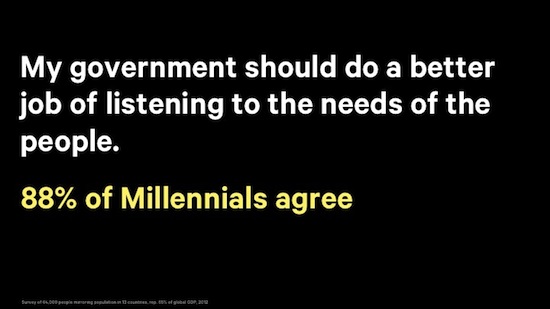As the Supreme Court begins hearing arguments on the validity of same-sex marriage in California, recent polls show that much of the support for marriage equality is driven by the Millennial Generation, a.k.a young adults 18-32, among whom support for this issue has reached 70 percent, according to The Pew Research Center.
This has telling implications for many of the socially divisive issues that have defined our national narrative for the last 50 years. Why? Because Millennials do not see a world divided by black or white, gay or straight, male or female. The issue of gender attitudes is the focus of my forthcoming book, The Athena Doctrine, written with Pulitzer Prize-winning author Michael D'Antonio, in which we found that Millennials around the world possess a more inclusive attitude when it comes to the role of women and girls in their society.

Data collected in thirteen nations that comprise 65 percent of global GDP shows that Millennials have a fundamentally stronger appreciation of femininity than their more adult counterparts -- and this sentiment exists in highly masculine societies as well: Three-quarters of Japanese and South Korean youth are critical of male behavior, as well as two-thirds of global Millennials. There's even a double digit 'generation gap' between Millennials and men in countries like Germany, South Korea and India.
Of course, we can attribute part of this to the Internet, where young people feel connected, informed and empowered. One of the start-ups we met was Bambuser, a live-streaming video technology provider begun by Jonas Vig and Måns Alder from Sweden. During the Egyptian uprising in Tahir Square, Bambuser became a critical tool for citizen-fed journalism, chronicling the uprising live. The result was so sensational that the Egyptian government shut down Bambuser long before they dismantled Twitter access.
This connectedness, powered by social media, has allowed youth to sample from each other, offering them exposure to ideas that previous generations did not have open access to. Notably, when asked if the world would be a better place if more men thought like women, Millennials in the highly masculine societies of China, Japan, South Korea and India agreed even more strongly than the women in their countries.
The lesson to our highest court is that the world is changing fast -- not only on this issue, and not only in America. The values and attitudes of the world's youth are ascending swiftly. And they are not divided.
